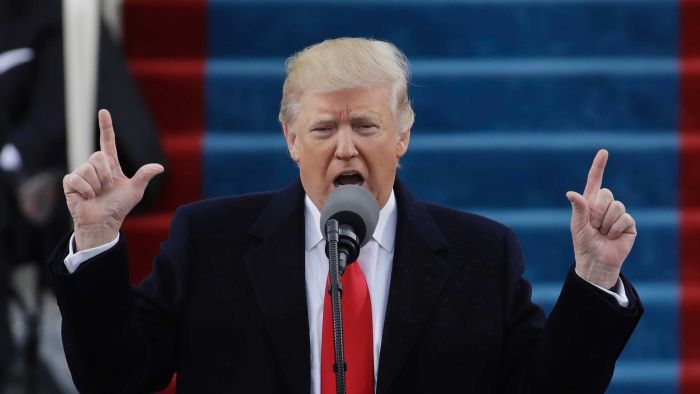Donald Trump: European nations taste possible future US foreign policy under 'erratic' President
Updated
European nations this week had an early taste of what US foreign policy might look like under Donald Trump's incoming administration.
Days before his inauguration, the President-elect criticised NATO — a central pillar in US-Europe relations — as obsolete.
He berated German Chancellor Angela Merkel for accepting more than a million refugees into Germany. And he predicted the European Union would continue to fracture, once the UK makes its exit.
European leaders reacted to the comments with a mix of alarm and bewilderment.
"It is difficult to read this interview to the end without feeling concerned," said Germany's Foreign Minister Frank-Walter Steinmeier.
"I just can't believe that an American administration would follow the thought process that Europe is not somehow important to the US."
'He shoots from the hip'
As US President, Donald Trump will become the country's number one diplomat, even if diplomacy is not his strong suit. Impulsive — even abrasive — comments have been part of the Trump style at home and abroad.
"He seems to have a kind of a devotion to unpredictability and to impulsiveness. There's a great deal I think of anxiety and uncertainty about what a Trump foreign policy might look like," said Professor James Curran from the University of Sydney.
Indeed, this is the man who last year asked, "why can't we use nuclear weapons?" after stating a wish to "nuke" Islamic State militants.
Just over a year ago, Britons launched a petition to have Mr Trump banned from the UK after he said radicalised Muslims had made parts of London a no-go zone.
And within hours of his election in November, the President-elect managed to offend China — the United States' biggest trade partner — by taking a phone call from the Taiwanese President, in defiance of the longstanding One China Policy.
"The great danger of Donald Trump is that ... he shoots from the hip, and he is strikingly ignorant of the world. And that is a deadly combination," said Tom Switzer, a senior fellow at the Sydney-based United States Studies Centre.
Both Mr Switzer and Professor Curran say Mr Trump lacks a core ideology that makes it difficult to predict US foreign policy in the months and years ahead.
"I think America is about to take a plunge into the great unknown. His statements on foreign policy, on domestic policy, have been erratic," Professor Curran said.
 Photo:
Donald Trump and his wife Melania arrive aboard a US Air Force jet at Joint Base Andrews, Maryland, before the inauguration. (Reuters: Jonathan Ernst)
Photo:
Donald Trump and his wife Melania arrive aboard a US Air Force jet at Joint Base Andrews, Maryland, before the inauguration. (Reuters: Jonathan Ernst)
Some positives in ties to Russia: Professor
Until now the incoming President has given little detail on how a Trump administration would approach key foreign policy challenges, namely conflicts in the Middle East, the rise of China and relations with Russia.
"Trump has a summons to 'Make America Great Again' but it's not the sounding of a trumpet to assert American predominance around the world," Professor Curran said.
"It's to restore America's economic viability on the home front, and to continue economic growth in America that we've seen in the last six months."
Like president Barack Obama before him, Mr Trump has stated a broad desire to redefine America's role in the world, in a way that reflects its changing circumstances. But their temperaments are vastly different, Mr Switzer said.
"Obama was cool, calm and collected, whereas Trump is an erratic character."
Nevertheless, Mr Switzer said he saw some positives in Mr Trump's business ties to Russia and his support of Russian President Vladimir Putin.
"I think what distinguishes Donald Trump from, say President Obama, is that Trump is prepared to work with the Kremlin to defeat these jihadists in both Iraq and in Syria," he said.
"Now at first glance that's a wise strategy because although the Assad regime and the sectarian regime in Baghdad are pretty brutal governments, we'd be better off having those governments in place than the Sunni jihadists and other rebels who may well cause more mayhem.
"He is right to criticise this mindless cold war against Russia, especially when you consider that there are many interests that overlap with Russia.
"Both Russia and America have an interest in defeating Islamic State jihadists. They have an interest in keeping in check Iran's nuclear ambitions. They have an interest in ending the Syrian civil war. They have an interest in arms control, and they have an interest in keeping in check a rising China which frankly represents a greater threat to American strategic interests than a declining power in Russia."
 Photo:
Donald Trump and his wife Melania take part in a Make America Great Again welcome concert at the Lincoln Memorial prior to the inauguration. (Reuters: Jonathan Ernst)
Photo:
Donald Trump and his wife Melania take part in a Make America Great Again welcome concert at the Lincoln Memorial prior to the inauguration. (Reuters: Jonathan Ernst)
A range of views in the Cabinet
Much will depend on Mr Trump's Cabinet and other political advisors — some of whom hold different views to their new boss.
"We need to wait and see how he will use the levers of power once he becomes president," Professor Curran said.
"And we need to wait and see what the outcome is of the kind of struggle within the White House between the various advisors who will have Trump's ear.
"There is a range of different views of America's role in the world amongst those advisors. And the outcome of that contest will be critical to the kind of foreign policy that Trump will enact."
Mr Trump's own choice as Secretary of State, Rex Tillerson, has supported continuing sanctions against Moscow, where Mr Trump has flagged their removal.
He has also spoken out against Russia's annexation of Crimea, where Mr Trump has flagged a more conciliatory stance. And the man chosen to head the CIA, Mike Pompeo, has described Russia as a major threat to world order.
Professor Curran said other members of Mr Trump's administration were even more hawkish, including the new National Security Advisor Michael Flynn.
"We have seen the remarkable resurgence of the neo-conservative element in American politics," he said.
"Despite having their fingers burnt so badly in Iraq, there are still those who are champing at the bit to reassert American power. They see Obama as weak. They see the Obama administration as exercising too much restraint and they're keen to reassert American dominance, not only in Europe particularly in terms of relations with Russia, but also in the Middle East and especially in terms of countering China's rise."
 Photo:
Donald Trump speaks before a rally of supporters in Concord, North Carolina. (ABC News: David Weber)
Photo:
Donald Trump speaks before a rally of supporters in Concord, North Carolina. (ABC News: David Weber)
'Diplomacy by Twitter' could prove dangerous
Very little is known too on where Mr Trump stands on issues that directly impact on Australia, particularly the rise of China and its militarisation in the South China Sea.
"There's the fear and alarm that we may well see American retrenchment from Asia," Professor Curran said.
"Trump has said virtually nothing on the pivot [to Asia]. We don't know his attitude towards Chinese militarisation in the South China Sea. We would fear his embarking on a trade war with the Chinese which would not be in the Australian national interest.
"I suspect that given his focus on the home front, he will want allies like Australia to be doing more. For example, in terms of potentially countering Chinese militarisation in the South China Sea, this could put Australia in a very uncomfortable position.
"Similarly the trade war that he has spoken about embarking on with China — using tariffs as a punitive tool against the Chinese — would also not be in Australia's national interest. So Australia is going to have to be very cautious, very prudent and very pragmatic in deciding precisely what kind of policy of Trump they will like to line up behind."
For all the uncertainty, one thing is clear. Unlike his predecessors, the new US President has a habit of bypassing his advisors altogether and using social media to make political statements.
Such "diplomacy by Twitter" could prove dangerous for a man who is now also Commander-in-Chief of US forces.
"This is a President who will conduct foreign policy not through grand pronouncements and thoughtful or reflective speeches, but through Twitter. And the capacity for misunderstanding and miscalculation I think is greater," Professor Curran said.
"This President has not been tested in a crisis. How he deals with some of those qualities and characteristics that he exhibited so forcefully on the campaign trail — they are not necessarily the same kinds of qualities that will be needed to handle the nuance that is so often required in foreign policy situations."
Topics: world-politics, government-and-politics, us-elections, united-states
First posted














